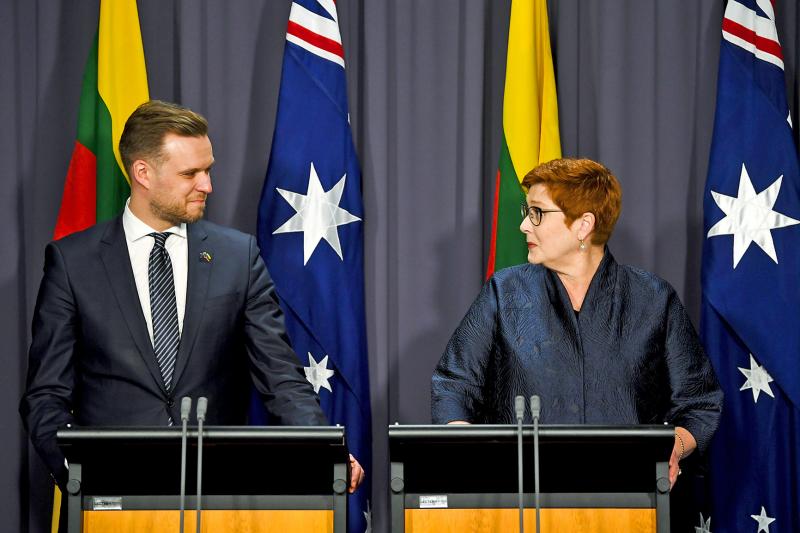The foreign ministers of Australia and Lithuania yesterday agreed to step up cooperation on strategic challenges, in particular pressures from China.
Lithuanian Minister of Foreign Affairs and his Australian counterpart, Marise Payne, met at Parliament House in Canberra.
Australian exporters have lost tens of billions of US dollars to official and unofficial Chinese trade barriers covering coal, wine, beef, crayfish and barley that have coincided with deteriorating relations with Beijing.

Photo: EPA-EFE
Lithuania drew Beijing’s ire after breaking with diplomatic custom by agreeing that Taiwan’s office in its capital, Vilnius, would bear the name Taiwan instead of Taipei.
“For quite a while, Australia was probably one of the main examples where China is using economy and trade as a political instrument or, one might say, even as a political weapon,” Landsbergis told a news briefing with Payne.
“Now Lithuania joins this exclusive club ... but it is apparent that we’re definitely not the last ones,” he added.
Payne said she agreed with Landsbergis on the importance of like-minded countries working together with a consistent approach to maintaining the international rules-based order, free and open trade, transparency, security and stability.
“There are many colleagues with whom the foreign minister [Landsbergis] and I work and engage on these issues ... the more I think we are sending the strongest possible message about our rejection of coercion and our rejection of authoritarianism,” Payne said.
Landsbergis welcomed Australia to WTO consultations over a complaint by the EU accusing Beijing of holding up goods — both from member nation Lithuania and from EU companies that use Lithuanian components — at China’s borders.
“We need to remind countries like China or any other country that would wish to use trade as a weapon that like-minded countries across the globe ... have tools and regulations that help withstand the coercion and not to give in to ... political and economic pressures,” Landsbergis said.
Lithuania’s first embassy in the 31-year history of bilateral ties opened in Canberra yesterday. Australia plans to open a trade office in Lithuania soon.
Payne told the news briefing that Australia is not looking at renaming Taiwan’s de facto embassy in the country and remains committed to its “one China” policy.
Payne said she had not held any talks with Taiwan about the possibility of changing the name of its representative office in Australia.
“No discussions of that nature,” she said. “Australia remains committed to our one China policy.”
Additional reporting by Reuters

The paramount chief of a volcanic island in Vanuatu yesterday said that he was “very impressed” by a UN court’s declaration that countries must tackle climate change. Vanuatu spearheaded the legal case at the International Court of Justice in The Hague, Netherlands, which on Wednesday ruled that countries have a duty to protect against the threat of a warming planet. “I’m very impressed,” George Bumseng, the top chief of the Pacific archipelago’s island of Ambrym, told reporters in the capital, Port Vila. “We have been waiting for this decision for a long time because we have been victims of this climate change for

Rainfall is expected to become more widespread and persistent across central and southern Taiwan over the next few days, with the effects of the weather patterns becoming most prominent between last night and tomorrow, the Central Weather Administration (CWA) said yesterday. Independent meteorologist Daniel Wu (吳德榮) said that based on the latest forecast models of the combination of a low-pressure system and southwesterly winds, rainfall and flooding are expected to continue in central and southern Taiwan from today to Sunday. The CWA also warned of flash floods, thunder and lightning, and strong gusts in these areas, as well as landslides and fallen

MASSIVE LOSS: If the next recall votes also fail, it would signal that the administration of President William Lai would continue to face strong resistance within the legislature The results of recall votes yesterday dealt a blow to the Democratic Progressive Party’s (DPP) efforts to overturn the opposition-controlled legislature, as all 24 Chinese Nationalist Party (KMT) lawmakers survived the recall bids. Backed by President William Lai’s (賴清德) DPP, civic groups led the recall drive, seeking to remove 31 out of 39 KMT lawmakers from the 113-seat legislature, in which the KMT and the Taiwan People’s Party (TPP) together hold a majority with 62 seats, while the DPP holds 51 seats. The scale of the recall elections was unprecedented, with another seven KMT lawmakers facing similar votes on Aug. 23. For a

All 24 lawmakers of the main opposition Chinese Nationalists Party (KMT) on Saturday survived historical nationwide recall elections, ensuring that the KMT along with Taiwan People’s Party (TPP) lawmakers will maintain opposition control of the legislature. Recall votes against all 24 KMT lawmakers as well as Hsinchu Mayor Ann Kao (高虹安) and KMT legislative caucus whip Fu Kun-chi (傅崐萁) failed to pass, according to Central Election Commission (CEC) figures. In only six of the 24 recall votes did the ballots cast in favor of the recall even meet the threshold of 25 percent of eligible voters needed for the recall to pass,